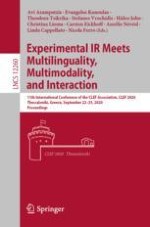This book constitutes the refereed proceedings of the 11th International Conference of the CLEF Association, CLEF 2020, held in Thessaloniki, Greece, in September 2020.*
The conference has a clear focus on experimental information retrieval with special attention to the challenges of multimodality, multilinguality, and interactive search ranging from unstructured to semi structures and structured data.
The 5 full papers and 2 short papers presented in this volume were carefully reviewed and selected from 9 submissions. This year, the contributions addressed the following challenges: a large-scale evaluation of translation effects in academic search, advancement of assessor-driven aggregation methods for efficient relevance assessments, and development of a new test dataset.
In addition to this, the volume presents 7 “best of the labs” papers which were reviewed as full paper submissions with the same review criteria. The 12 lab overview papers were accepted out of 15 submissions and represent scientific challenges based on new data sets and real world problems in multimodal and multilingual information access.
* The conference was held virtually due to the COVID-19 pandemic.
